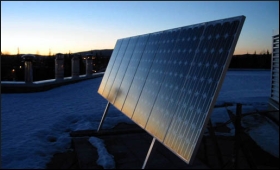|
|
|

|
Solar-like duty structure for wind sector to check Chinese imports
|
|

|
|
| Top Stories |
 |
|
|
|
SME Times News Bureau | 31 Jul, 2020
Following curbs on import
concessions in the solar energy sector, the government may levy higher
taxes on wind turbine components and generators to encourage use of
local equipment and give a boost to domestic manufacturing.
Government
sources said that the tax concessions available to the wind power
sector for sourcing certain equipment required for making wind turbines
and generators may be withdrawn and local manufacturers will be
encouraged to produce these components.
The move is akin to the
plan for the solar power sector where the power ministry has proposed
higher basic customs duty of 20-25 per cent on solar modules and cells
to restrict imports largely from countries such as China. Already there
is a safeguard duty on solar equipment imports.
Even in the wind
sector, higher duty will affect imports of components from China that
is the biggest supplier of such material to Indian manufacturers of wind
turbines.
But unlike in the solar sector, where generators
import more than 80 per cent of modules from China due to the huge price
advantage and limited domestic capacity, in the wind power sector more
than 80 per cent of turbines are made in India. Only a few critical
components and materials are imported from China.
At present,
wind components such as special bearings, gear box, yaw components, wind
turbine controllers, blades for rotor of wind-operated electricity
generators, sub-parts of such blades, catalyst for use in the
manufacture of cast, resin for use in the manufacture of cast components
of wind-operated electricity generator are imported. These attract a
concessional duty of 5 per cent.
This may be raised to levels
closer to the duty proposed for solar power equipment to discourage
imports and boost domestic manufacturing.
It is likely that
changes in the wind power component duty structure may be implemented
from the next fiscal to give time to domestic industry to find an
alternative to imports.
The push for strengthening domestic
manufacturing is coming from the government's ‘Atmanirbhar Bharat'
initiative that is looking at import substitution and developing local
capabilities. But the process has gathered added momentum after the
recent border clashes between India and China and the simmering tension
on the Line of Actual Control.
The concessional duty structure
for the wind sector was set up in 2003 when the industry was not well
developed. Now most of the manufacturing happens in the country and the
industry is fairly developed to scale up through its own capacities.
|
|
|
| |
|
|
|
|
|
|
|
|
|
|
|
|
|
|
| |
| Customs Exchange Rates |
| Currency |
Import |
Export |
US Dollar
|
₹91.35
|
89.65 |
UK Pound
|
₹125.3
|
₹121.3 |
Euro
|
₹108.5
|
₹104.85 |
| Japanese
Yen |
₹58.65 |
₹56.8 |
| As on 19 Feb, 2026 |
|
|
| Daily Poll |
 |
 |
| What is your primary "Make or Break" expectation from the Finance Minister this year? |
|
|
|
|
|
| Commented Stories |
 |
|
|
|
|
|
| |
|